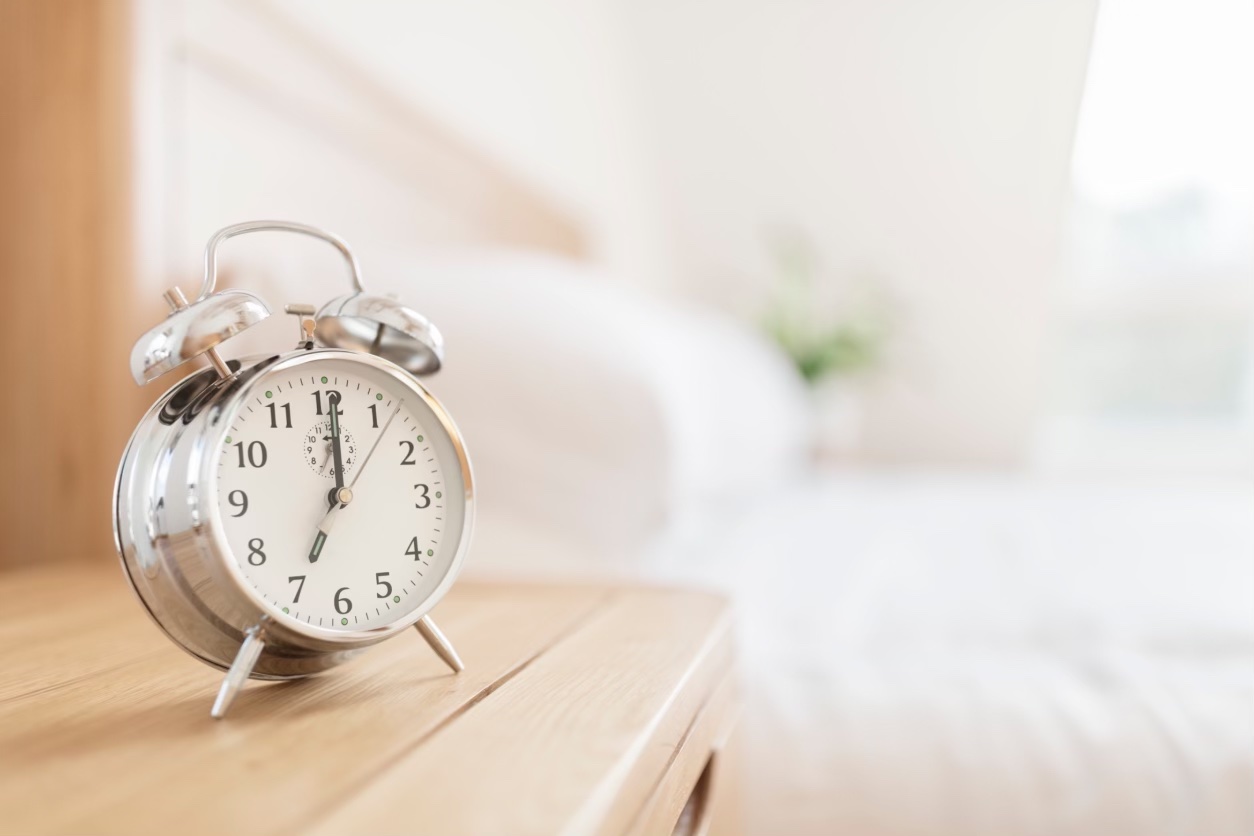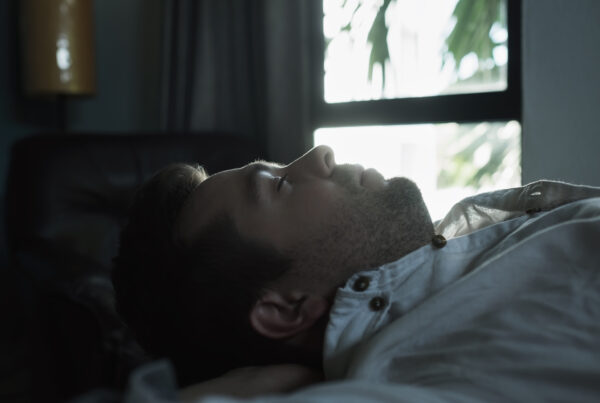”Question: What are some ways I can improve my sleep routine?
Reading time: 5 Minutes
MWi Hack:
- Understand what actions can throw off your sleep routine.
MWi Summary:
-
- Here are five tips to fix your sleep routine:
- Reduce artificial light exposure
- Cut down on evening screen time
- Commit to physical activity
- Avoid stimulants at night
- Align as closely with day and night as possible in your personal circumstances
- Here are five tips to fix your sleep routine:
One of the best ways to promote consistent sleep is having a healthy sleep routine. By following a standard schedule and healthy sleep habits, the mind and body become accustomed to a routine that includes plenty of high-quality sleep.
Unfortunately, many factors can throw a sleep routine out of whack. When that happens, bedtimes and wake-up times can fluctuate wildly, and a person may bounce back and forth between nights of too much and too little sleep.
Knowing how to reset your sleep routine offers a way of resolving this type of sleep inconsistency. It also provides a blueprint for people who are looking to optimize their sleep and be in a position to get the best sleep possible every night.
What Are the Best Tips for Resetting Your Sleep Routine?
There are multiple elements to a healthy sleep routine. Setting a consistent sleep schedule is a start, but other steps can help you achieve the sleep you need.
Sleep hygiene plays an essential role in making your sleep routine effective. One fundamental part of sleep hygiene is ensuring that your daily habits and sleep environment are conducive to sleep and work in your favor:
- Get a daily dose of natural light: Because daylight is a vital influence on your circadian rhythm, exposure to natural light can promote better synchronization of your internal clock.
- Reduce artificial lighting at night: Keeping your lights on long into the evening can prevent your body from properly transitioning toward sleep. Try using a dimmer or low-wattage lamp to minimize the brightness of indoor lighting.
- Cut down on evening screen time: Cell phones and other devices are sources of excess mental stimulation and emit blue light that can affect circadian timing. To avoid the negative effects of screen time on sleep, try not to use your phone, tablet, or laptop for at least an hour before bed.
- Commit to physical activity: Regular exercise is good not only for your cardiovascular health but also for your sleep. You don’t have to be a triathlete to get these benefits; even mild physical activity like going for a walk can be beneficial, and it’s a great opportunity to get daylight exposure. If you are going to do intense exercise, try to finish your workout at least an hour before bed.
- Have a bedtime routine: Consistent cues can play a powerful psychological role in routines. For this reason, try to follow the same steps each night before going to bed such as dimming the lights, quietly reading or stretching, putting on pajamas, and brushing your teeth. Over time, those actions become cues that tell you that it’s time for sleep.
- Develop a personal relaxation plan: Being able to relax both mentally and physically is a major contributor to falling asleep easily. Regardless of whether it’s meditation, yoga, listening to soothing music, reading, or another activity, make time in your bedtime routine for whatever relaxation method that allows you to wind down.
- Be careful with naps: There are times during the day when your energy level dips and you may be tempted to nap. While naps can be restorative in some cases, they can disrupt your sleep routine if you’re not careful. As a general rule, try to keep naps under 30 minutes and only early in the afternoon so that they don’t make it harder to get to sleep at night.
- Limit alcohol and caffeine: Both alcohol and caffeine can be detrimental to a healthy sleep routine. Alcohol makes you sleepy but affects your sleep cycle, making you prone to awakenings and lower-quality sleep as the night goes on. Caffeine makes you wired and alert and can linger in your system, frustrating attempts to fall asleep at bedtime. As a result, it’s best to eliminate or reduce consumption of alcohol and caffeine, especially in the late afternoon and evening.
- Cultivate an inviting sleep environment: You want your bedroom to be quiet and dark to avoid disruptions. A cool yet comfortable temperature and soothing smells, like lavender, may promote relaxation and provide cues for sleep. Finding the best mattress, best pillow, and bedding can make your bedroom a haven for comfort and rest.
If you have significant sleeping problems, talk with your doctor about the best way to reset your sleep routine. Depending on the causes of your sleep difficulties, a doctor may recommend therapies to adjust your sleep routine such as:
- Melatonin: This hormone is made naturally by the body when darkness falls, and it helps stabilize circadian rhythm and promote sleep. For some sleep conditions, melatonin supplements can help kickstart a new sleep pattern.
- Light Therapy: This treatment involves sitting in front of a high-powered lamp for a short period of time, usually in the morning. The high dose of light is designed to help correct for a misaligned circadian rhythm.
- Cognitive behavioral therapy for insomnia (CBT-I): This type of therapy works to identify and reorient negative thoughts and behaviors about sleep, while structuring a plan for a healthier sleep routine.
How Does a Sleep Routine Get Thrown Off?
There are multiple ways for sleep routines and circadian rhythms to get thrown off-kilter:
- Jet lag: Associated with rapid traveling across multiple time zones, jet lag occurs when the body’s internal clock is at odds with the day-night cycle at the travel destination.
- Shift work: People who work night shifts have to be awake when it’s dark and sleep when the sun’s out, disrupting normal circadian synchronization.
- Advanced or delayed sleep timing: Some people are extreme “early birds” or “night owls,” meaning that their sleep timing, also known as their sleep phase, is shifted forward or back by several hours.
- Artificial light exposure: Biologically, the circadian rhythm developed to correspond to sunlight long before electricity was invented. However, the brain responds to artificial light as well, which means that constant exposure to indoor lighting as well as electronic devices like cell phones, tablets, televisions, and computers can interfere with typical signals that convey whether it’s day or night.
- Fluctuating sleep hours: Many people have no set bedtime or wake-up time. Their sleep schedule can swing wildly back and forth from one day to the next or between weekdays and weekends, which prevents establishing a steady sleep pattern.
- Behavior choices: Deciding to stay up late or wake up early to study, play sports, or take part in social activities can throw off normal sleep routines.
- Caffeine and energy drinks: Stimulants may help you feel alert, but they can upset the body’s ability to naturally balance sleep and wakefulness, making it more difficult to sleep when you need to.
- Stress and emotional difficulties: Many sleeping problems are tied to stress, anxiety, depression, and other emotional or mental health problems. These conditions can cause the mind to race when it’s time for sleep or cause sleepiness during the day when you should be awake, foiling hopes of a consistent and healthy sleep routine.
How Can You Adjust Your Sleep Routine?
Adjusting your sleep routine starts by making consistency a priority. Habits and routines are powerful precisely because they are repeated over and over again in order to create a pattern.
A key first step is to reset your sleep schedule. Pick a bedtime and wake-up time that you can stick with and that offer ample time for the sleep you need. Follow this schedule every day, even on weekends.
At first, you may find it hard to adjust to this new sleep schedule, and that’s normal. A new routine won’t feel normal immediately; it takes time to get used to.
In order to gradually adjust to a new sleep schedule, you can make adjustments in 15 or 30 minute increments over a series of days. You can also focus first on the wake-up time, creating one fixed part of your schedule, and then use the tips described below to modify your sleep habits so that you can incrementally get used to falling asleep at your scheduled bedtime.
What Is the Ideal Time To Go To Bed and Wake-Up?
There is no single ideal time for going to bed and waking up that is best for everyone. In general, in order to synchronize your circadian rhythm, you should try to wake up around the start of daylight hours and wind down and get ready for bed when it gets dark in the evening.
That said, daylight hours can vary significantly based on your geographic location, and for many people, it’s impractical to follow a sleep schedule that strictly follows the day-night cycle. For that reason, the general principles to follow are that your bedtime and wake-up time should:
- Stay consistent from day-to-day
- Provide for seven to nine hours of sleep
- Align as closely with day and night as possible in your personal circumstances
Does Pulling an All-Nighter Help Rest Your Sleep Routine?
Pulling an all-nighter doesn’t help develop a better sleep routine. Without sleeping, you’re likely to suffer from impaired thinking and concentration the next day, putting you at risk of accidents, including potentially life-threatening auto accidents.
In addition, your sleep isn’t normal after a period of sleep deprivation. For example, your sleep stages may be off-kilter because of a REM sleep rebound , which means you spend an abnormal amount of time in the rapid eye movement sleep stage. Because staying up all night is contrary to healthy sleep practices, it isn’t normally advised for resetting your sleep routine.
While there is a method, known as chronotherapy, that adjusts your sleep schedule by staying up later and later at night to reach your desired bedtime, it’s far different than just pulling an all-nighter. Even in the circumstances where it may be beneficial, chronotherapy requires careful planning and should only be conducted under the guidance of a trained health professional.






